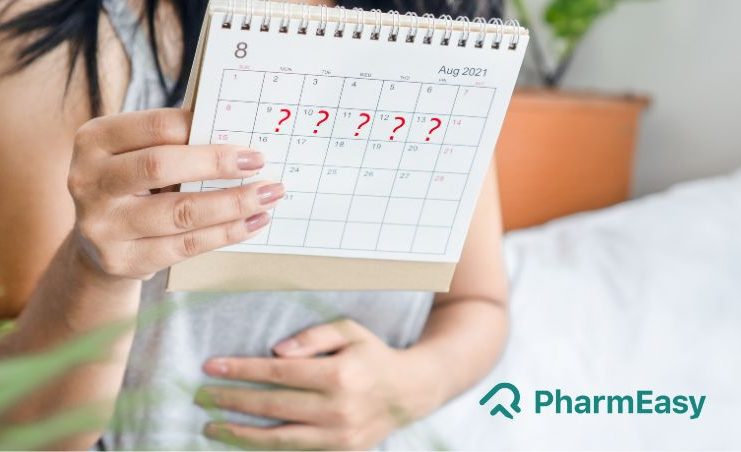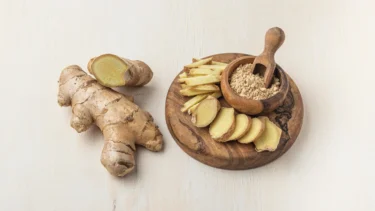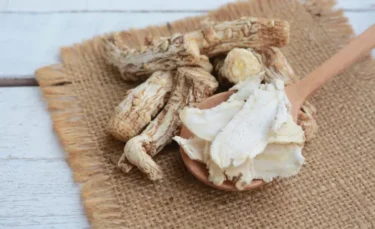Quick Tips on How to Get Your Period Faster and Safely
By Dr. Charmi Shah +2 more

Get,

to manage your symptom
Get your,


4 Cr+ families
benefitted

OTP sent to 9988776655



You’ve successfully subscribed to receive
doctor-approved tips on
Whatsapp

Get ready to feel your best.

Hi There,
Download the PharmEasy App now!!


Register to Avail the Offer
Send OTPBy continuing, you agree with our Privacy Policy and Terms and Conditions

Hi There,
Sign up on PharmEasy now!!
Trusted by 4 crore+ families

OTP sent to 9988776655



You have unlocked 25% off on medicines




Code: NU25
By Dr. Charmi Shah +2 more
Table of Contents
Most women of reproductive age menstruate unless they are pregnant, breastfeeding, or have underlying medical conditions. On average, a normal menstrual cycle lasts about 28 days (with a variation of roughly 7 days more or less), though it can range from 21 to 35 days in adults and 21 to 45 days in young teens1.
You might wonder whether there are ways that may help your period start sooner. Before we get into that, let’s first understand what a normal menstrual cycle looks like and how it differs from an irregular one. We’ll also explore common reasons why periods may be delayed.

Next, we’ll discuss safe ways to manage delayed periods, including lifestyle adjustments, natural approaches, and medical options, while highlighting what is safe and what should be avoided. Then we’ll check the risks and safety tips to keep in mind. Ready? We will also answer some common questions about periods in the end!
Friendly Reminder: The information shared here is for educational purposes only and the reader should consult a registered medical practitioner before implementing any changes to their health routine.
First, let’s get the basics right. Knowing what a healthy menstrual cycle is and what causes delays is important.
The menstrual cycle prepares your body for pregnancy and is influenced by certain reproductive hormones. These hormones thicken the inner lining of the uterus, preparing it for implantation of a fertilised egg. If an egg is not fertilised during this cycle, hormone levels drop. This starts a “period” as the lining sheds1.
There are several reasons why your period may be delayed, including the following2:
Lifestyle or food changes may be made should you wish to get your periods faster for just one cycle. However, if your “how to get periods immediately or faster” is a more recurring query, you need medical guidance as frequently delayed periods might need some medical intervention.
Dr Ashish Bajaj, M.B.B.S., M.D. in Clinical Pharmacology and Toxicology
Still searching for how to make your period start sooner over the internet? If your periods are late and you’re not pregnant or suffering from a medical condition, there are some approaches that may help your periods start sooner.
Many people use natural remedies and supplements to get their period started. It is important to remember that these traditional approaches lack strong scientific support and may work differently for different people.

Although it is said that vitamin C supplementation can possibly start periods, there is no scientific data to support this claim3. In fact, this is not a recommended method as high vitamin C doses may lead to kidney stones4.

Bromelain, an enzyme in pineapple, may affect menstrual hormones5.

Traditional wisdom believes that ginger can start menstruation by causing uterine contractions, even though there’s no solid proof of this6.

Parsley helps with balancing hormones in women and enhances oestrogen secretion7. Thus, it may help in getting the period sooner.

Some people believe turmeric can affect hormone levels and help induce periods, but there’s no scientific proof of this8.

These herbs may increase blood flow to the uterus or help shed the uterine lining, which may lead to periods9.
Caution: Periods cannot be reliably induced or hastened by foods, herbs, or home remedies. Traditional remedies, although believed to influence menstruation, are not proven to be effective and may carry health risks. These methods should be considered traditional beliefs, not evidence-based solutions. Therefore, always consult a gynaecologist before trying to manage or alter your menstrual cycle.
Ideally, one must not disturb body’s natural cycles. If your periods make your daily routine tasks difficult to carry out, consult a gynaecologist for evaluation.
Dr. Arpit Verma, MBBS, MD (Pharmacology)
Changing your lifestyle and being active might help start periods. However, remember, the effectiveness of these methods may vary from person to person.
High doses of vitamin C may induce menses by increasing the levels of oestrogen in the body. Increased levels of this hormone stimulate uterine contractions, which in turn, stimulates bleeding.
Dr. M.G. Kartheeka, MBBS, MD(Pediatrics)
While lifestyle changes may help some individuals, hormonal treatments provided by a healthcare professional are the most reliable way to regulate periods. Always consult your gynaecologist before starting any treatment.
Important caution: Hormonal contraceptives are intended for cycle regulation, not for immediately inducing a period. Any changes to dosage, timing, or method should only be done under a doctor’s supervision.
Also Read: PCOS Diet: How to Use Food to Help Manage Your PCOS
Any attempt to alter normal body function carries risks, and trying to induce a period is no different.
Never attempt to induce your period if there is any possibility of pregnancy, as this can lead to serious complications. Always consult a healthcare provider/doctor before trying any method to manage or regulate your cycle.
While attempting to induce periods can be beneficial sometimes, it has its own set of risks. You might face hormonal imbalances, disturbed period patterns, or side effects from medicines.
It’s important not to try and start your period if there’s a chance you might be pregnant. Substances that induce menstruation can also cause miscarriages.
Repeated irregular cycles may signal underlying health conditions such as PCOS, thyroid disorders, or premature ovarian insufficiency. Therefore, such cases require proper evaluation and workup by a doctor before attempting any intervention.
Get professional help if your period is consistently irregular, you miss three periods in a row, your periods stop before the age of 45, or you bleed between periods or after sex, or postmenopausal bleeding is noted.
Also Read: How To Know If You’re Pregnant?
We’ve covered what affects menstrual cycles, safe ways to manage delays, and the role of both natural and medical approaches. Remember, your body is unique, and variations in periods are normal. However, if your cycles are irregular or you miss three or more periods, consult a gynaecologist to rule out conditions like PCOS, thyroid disorders, or premature ovarian insufficiency. Avoid unproven or unsafe remedies, and rely on a healthcare provider for guidance on period-related concerns.
Also Read: Why is My Period Blood Black? Understanding the Underlying Health Facts
You could feel bloated or moody or have headaches, back pain, tender breasts, and cravings before your period arrives.
The substances used to induce periods can lead to a miscarriage. If you suspect you may be pregnant, do not attempt to induce your period. Instead, speak to a healthcare provider.
It’s important to note that attempting to induce your period artificially can have health risks. Menstrual cycles vary, and it’s best to let them occur naturally. If you have concerns about menstrual cycle irregularities, consult a healthcare professional for personalised advice.
While the chances are low, it is still possible to get pregnant during your period, especially if you have a shorter menstrual cycle. It’s crucial to use contraception consistently if you want to avoid pregnancy, as fertility varies among individuals.
Yes, a menstrual period may be delayed by 10 days due to various factors such as stress, hormonal changes, or underlying health conditions. If concerns persist, it is advisable to consult a healthcare professional for personalised guidance. Your period can be late due to stress.
No, a typical menstrual period does not occur during pregnancy. However, some pregnant individuals may experience light bleeding or spotting, often mistaken for a period. If there’s any uncertainty or concern, it’s essential to seek advice from a healthcare professional.
Yes, occasional period delays are normal and may be influenced by factors such as stress, hormonal fluctuations, or lifestyle changes. However, persistent or significant delays may warrant consultation with a healthcare professional to rule out underlying issues.
It is not possible to induce your period overnight. Menstrual cycles are natural processes influenced by hormonal changes. It’s crucial to maintain a healthy lifestyle, including regular exercise, balanced nutrition, and adequate sleep, for overall reproductive health. If you have concerns about your menstrual cycle, consult a healthcare professional for personalised advice.
Disclaimer: The information provided here is for educational/awareness purposes only and is not intended to be a substitute for medical treatment by a healthcare professional and should not be relied upon to diagnose or treat any medical condition. The reader should consult a registered medical practitioner to determine the appropriateness of the information and before consuming any medication. PharmEasy does not provide any guarantee or warranty (express or implied) regarding the accuracy, adequacy, completeness, legality, reliability or usefulness of the information; and disclaims any liability arising thereof.
Links and product recommendations in the information provided here are advertisements of third-party products available on the website. PharmEasy does not make any representation on the accuracy or suitability of such products/services. Advertisements do not influence the editorial decisions or content. The information in this blog is subject to change without notice. The authors and administrators reserve the right to modify, add, or remove content without notification. It is your responsibility to review this disclaimer regularly for any changes.
Comments

Leave your comment...
You may also like
Comments